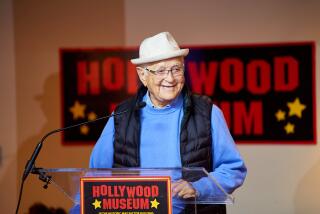Turning Away From a Grand Lifestyle : Trends: A couple turn their backs on the bright lights in New York and Los Angeles that left them anxious and empty.
- Share via
The walk-in closet of Norman Weiss is divided along the lines of his life. On the right are London-cut suits, power sport coats, tailored coordinates. These he collectively waves off. “My old uniform,” he says.
The clothing Weiss wears now hangs on the left, a much smaller collection of jeans and sweats that he wears to work. It reflects the casualness of the new life of Norman and Claire Weiss and the quieter way in which they live it.
Like a growing assortment of Americans, including many urban baby boomers who did not want to embrace the future where they were, the Weisses turned their backs on a grand lifestyle in New York and Los Angeles that left them anxious and empty.
“None of that’s important, I have found out,” Norman says. “The whole idea is to get rid of all that crap and live a simple, unencumbered life.”
These are not sentiments of an ascetic, nor are the Weisses thimble-brained greenhorns hoping to live off the land. They are, in fact, seven years into second careers as the proprietors of a bookshop in the mountain resort town of Park City, Utah.
The Weisses are representative of a category the U.S. Census does not measure but should, given the potentially profound impact of fast growth on undeveloped communities. These are people migrating not because of economics or job loss or transfer, but because they want to play out their lives differently.
“Some people learn sooner than others,” Norman says, suggesting he would not have minded if this epiphany had occurred earlier than it did. Norman is 66. Claire is 60.
For 35 years, Norman was in the entertainment business, first in New York and then in California. As a manager, agent and promoter, Weiss was involved with Dinah Shore, Paul Anka, Jerry Lewis, Joel Grey, Bette Midler, Michael Douglas, Al Pacino, Elvis Presley, Frank Sinatra. He signed the Beatles to come to America.
Norman was a shepherd whizzing around the country on private planes tending to his stars. A record here, a movie there, concerts, personal deals, the trouble-shooter and problem-solver. “My feet never touched the ground. I’d get picked up in a limo, driven right to the plane, and there’d be another limo on the other end.”
For this, Norman pulled down $300,000 or so a year and an equivalent amount of stress. Even though he hobnobbed with the glitzy, he tired of making the same deals with the same people in the same small circle. “It started boring me to tears,” he says, “and I just didn’t want to do it any more.”
Norman’s fantasy, to own a bookstore, was not shared by Claire, an interior designer quite content with fancy cars, friends in entertainment and the wherewithal that went with it.
Norman was so unhappy, however, that they decided to invest in a local bookstore that Norman could run part-time as he phased out of entertainment. When the building in which the store was located was torn down in 1983, they had to decide whether he could or should continue to fight Los Angeles’ cutthroat booksellers with an independent little shop.
“One day I’m reading Publisher’s Weekly and there’s an ad, a bookstore for sale in Park City,” Norman says. They had never been there, but Park City was the winter getaway friends raved about. Claire reluctantly agreed to go see, but made her impulsive husband promise to look but not deal.
“I promised,” says Norman, whose gravelly voice and devilish twinkle are reminiscent of Lee Marvin, “but I lied.”
Norman concedes, however, that Claire hated their new life for several years. “We knew nobody up here. All of her friends, all of her family were in L.A. and New York. Our kids were back in L.A., so it was very alien to her.”
It took a while for Claire to share Norman’s vision, but now she does wholeheartedly. “Utah was one of those states you fly over,” she says. “But, you know, we were in a tight little circle and that had a lot to do with it. I love living here now.”
They bought Dolly’s Books Etc., on Main Street between the liquor store and the post office. “That’s one of the great things,” Claire says. “People come to the post office and they stop at Dolly’s.”
In the summer, except for an annual arts festival that recently drew 100,000 visitors, Park City is a browsing kind of town 30 miles east of Salt Lake City. Its main business district is half a mile long and uphill. The permanent population is about 5,200 in a county of 17,000.
In the winter, however, greater Park City is one of the nation’s premier ski resorts. Tens of thousands of skiers pack the area’s rental units and the homes and condos kept by the well-to-do.
In their first winter, Norman says, it snowed for 53 consecutive days, but white is gold in Park City. When Dolly’s goes into its winter mode, it is open 10 to 10, seven days a week, eight employees instead of five. The Weisses work harder than ever, and find it exhilarating.
Park City’s cachet is remarkable because the city, thrown together after soldiers discovered silver in the 1860s, nearly succumbed decades ago after silver prices declined. Roughly $400 million came out of the mountains, launching such fortunes as the Hearst publishing empire.
Snow now is bigger than silver and Park City commerce last year was worth $163 million, double five years ago. Like any boom town, growth has caused problems and today it pits those who would like things to calm down against those who savor the expansion. Newcomers like the Weisses crowd Park City, as do the subdivisions all around it.
The Weisses have mixed feelings. Commerce is what keeps registers ringing. Only five years ago, when proposed changes in the federal tax laws scared up a local recession, 13 stores were empty on Main Street.
Dolly’s grossed more than $500,000 last year, quite enough to support them and their son Gary, 39, who two years ago moved from Los Angeles. A landscape architect, Gary and his wife, Shelley, live 25 miles away in the tiny town of Oakley.
Gary is struck by how easy it is to get involved. “Here, all you have to do is say you want to, and you can do anything. You can materially affect your community just by wanting to. It’s one of the biggest differences between a small place and a big place.”
And he is not worried about what might seem to be a town of limited opportunity. “As long as the economy stays relatively whole, there are fabulous opportunities here. You can do very well. This winter I’m going to work in the store and be a ski instructor, and, if I wanted to, I could also have a third job. You can’t make a lot of money, but you don’t need a lot of money to live here.”
His parents also are involved in ways that surprise them. Norman, for whom civic duty used to mean renewing his driver’s license, is involved in the local art center, chamber of commerce, Main Street Assn. They also helped stage the community’s first formal Passover seder, in a Catholic church, and attracted Jews, Mormons and others.
They now drive four-wheel-drive Subarus, sensible in the snow.
“Do you miss the two Mercedeses?”
“Not in the least,” Norman says.
“Then why did you have them?”
“Because I was a fool. All the successful guys in my business had Mercedeses or Rolls or BMWs, so you went along with it. The only one that ever really knew what I drove was the doorman at the Beverly Hills Hotel.
“My friends in L.A., most of them still don’t understand what I did or why I did it,” Norman says. “And yet they all say, ‘You’re our idol. You did what all of us want to do.”
While Claire still travels to New York to buy for the store, Norman is content in Park City and wants no more of the Big Apple. “I’ve grown unused to it, and I just couldn’t deal with it,” he says of his last visit five years ago.






